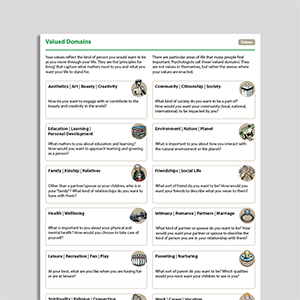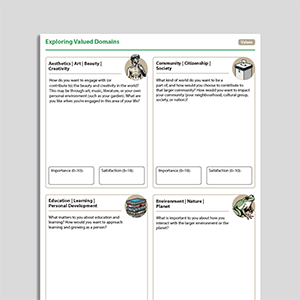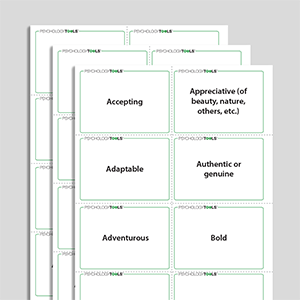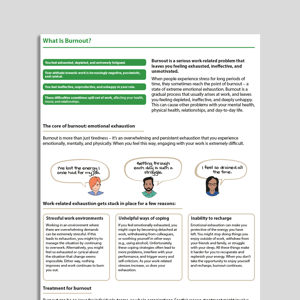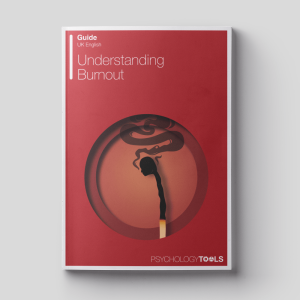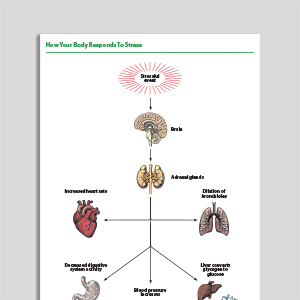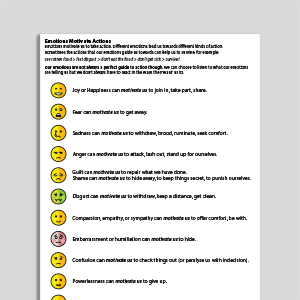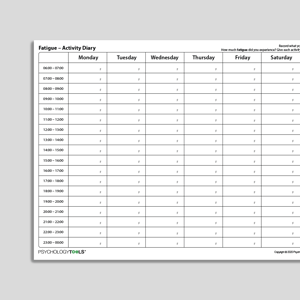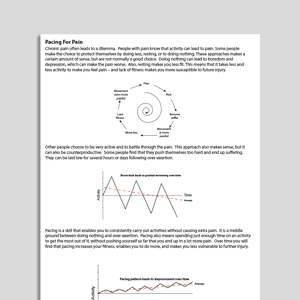Fatigue
Chronic Fatigue Syndrome (CFS) / Myalgic Encephalomyelitis (ME) is characterized by extreme fatigue, post-exertional malaise, and feeling generally unwell. The causes for CFS/ME are not fully understood and possible causes include viral infections, immune disturbances, or disturbances to the central nervous system. As with any human experience, CFS has a psychological component, which means that psychological approaches can form part of a support or treatment package for CFS/ME.
Showing 1 to 11 of 11 results
Values: Connecting To What Matters
Values: Connecting To What Matters
How Your Body Responds To Stress
How Your Body Responds To Stress
Links to external resources
Psychology Tools makes every effort to check external links and review their content. However, we are not responsible for the quality or content of external links and cannot guarantee that these links will work all of the time.
Guides and workbooks
- Pacing for people with M.E | Action For M.E.
Information Handouts
- CFS/ME Self-Management Workbook | Torbay & South Devon CFS/ME Service
-
ME/CFS Toolkit
| Centers For Disease Control And Prevention
- ME/CFS Assessment Overview
- What is ME/CFS?
- What are ME/CFS symptoms?
- Managing specific symptoms of ME/CFS
- Managing post-exertional malaise
- Other supportive strategies
- CFS self-help information | Cambridgeshire and Peterborough NHS
- Understanding chronic fatigue syndrome
- Self-help guide to recovery for chronic fatigue syndrome and fibromyalgia
- Post-exertional malaise avoidance toolkit | Solve ME/CFS Initiative
Treatment Guide
- CBT for chronic fatigue: therapist manual | Starbuck, Loades, Chapple | 2022
- CBT for Chronic Fatigue: Therapist Manual | Starbuck, Loades, Chapple | 2022
- CBT For CFS Participant Manual | Burgess, Chandler | 2004
- PACE: CBT for CFS/ME (Therapist manual) | Burgess, Chalder | 2004
Recommended Reading
- White, P. D., Goldsmith, K., Johnson, A. L., Chalder, T., & Sharpe, M. (2013). Recovery from chronic fatigue syndrome after treatments given in the PACE trial. Psychological medicine, 43(10), 2227-2235.
- Nijhof, S. L., Bleijenberg, G., Uiterwaal, C. S., Kimpen, J. L., & van de Putte, E. M. (2012). Effectiveness of internet-based cognitive behavioural treatment for adolescents with chronic fatigue syndrome (FITNET): a randomised controlled trial. The Lancet, 379(9824), 1412-1418.
- Marques, M. M., De Gucht, V., Gouveia, M. J., Leal, I., & Maes, S. (2015). Differential effects of behavioral interventions with a graded physical activity component in patients suffering from Chronic Fatigue (Syndrome): An updated systematic review and meta-analysis.Clinical psychology review,40, 123-137.
- Larun, L., Brurberg, K. G., Odgaard‐Jensen, J., & Price, J. R. (2016). Exercise therapy for chronic fatigue syndrome.Cochrane Database of Systematic Reviews, (2).
- Knoop, H., Prins, J. B., Moss-Morris, R., & Bleijenberg, G. (2010). The central role of cognitive processes in the perpetuation of chronic fatigue syndrome. Journal of psychosomatic research, 68(5), 489-494.
- Hartle, M., Bateman, L., & Vernon, S. D. (2021). Dissecting the nature of post-exertional malaise.Fatigue: Biomedicine, Health & Behavior,9(1), 33-44.
What Is Chronic Fatigue Syndrome / Myalgic Encephalomyelitis?
Signs and Symptoms of CFS/ME
CFS/ME is characterized by disabling tiredness (fatigue) that lasts a long time and cannot be explained by other causes. CFS/ME should be considered if the fatigue prevents the individual from doing things that they used to be able to, if the fatigue gets worse after activity or gentle exercise, or if the following symptoms are present:sleep problems
pain in the muscles or joints
headaches
sore throat or sore glands that aren’t swollen
problems thinking, remembering, concentrating, or planning
flu-like symptoms
feeling dizzy or sick or having palpitations
exercising or concentrating on something makes your symptoms worse
Psychological Models and Theory of CFS/ME
Understanding of the causes and maintenance of CFS/ME is incomplete. Biomedical factors likely play a role. Like any physical illness it is normal to have thoughts and feelings about symptoms and what they mean, and so psychological approaches also have potential clinical value. Models of CFS/ME including psychological factors include:Browne and Chalder (2006)
Burgess and Chalder (2004)
Vercoulen et al. (1998)
Harvey and Wessely (2009)
Roche, Dawson, Moghaddam, Abey, and Gresswell (2017)
Wiborg, Knoop, Frank, and Bleijenberg (2012)
References
Browne, T., & Chalder, T. (2006). Chronic fatigue syndrome. Psychiatry, 5(2), 48–51.
Burgess, M., & Chalder, T. (2004). Cognitive behaviourtherapy for CFS/ME: PACE manual for participants. MREC v. 2. Retrieved from: https://me-pedia.org/images/7/7a/PACE-cbt-participant-manual.pdf
Harvey, S. B., & Wessely, S. (2009). Chronic fatigue syndrome: Identifying zebras amongst the horses. BMC Medicine, 7(1), 58. https://doi.org/10.1186/1741-7015-7-58
Roche, L., Dawson, D. L., Moghaddam, N. G., Abey, A., & Gresswell, D. M. (2017). An Acceptance and Commitment Therapy (ACT) intervention for Chronic Fatigue Syndrome (CFS): A case series approach. Journal of Contextual Behavioral Science, 6(2), 178–186.
Science Media Centre (2018). Science Media Centre Factsheet: CFS/ME—The illness and the controversy. Retrieved from: http://www.sciencemediacentre.org/wp-content/uploads/2018/03/Science-Media-Centre-Factsheet-CFS-ME.pdf
Vercoulen, J. H. M. M., Swanink, C. M. A., Galama, J. M. D., Fennis, J. F. M., Jongen, P. J. H., Hommes, O. R., van der Meer, J. W., & Bleijenberg, G. (1998). The persistence of fatigue in chronic fatigue syndrome and multiple sclerosis: Development of a model. Journal of Psychosomatic Research, 45(6), 507–517.
Wiborg, J. F., Knoop, H., Frank, L. E., & Bleijenberg, G. (2012). Towards an evidence-based treatment model for cognitive behavioral interventions focusing on chronic fatigue syndrome. Journal of Psychosomatic Research, 72(5), 399–404.
![[Free Guide] An Introduction To Values](https://assets-media.psychologytools.com/28518/conversions/*-an_introduction_to_values_en-gb_Guides_Cover-preview.png)
